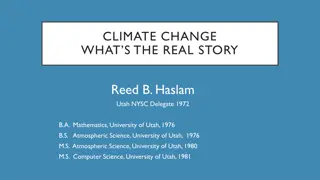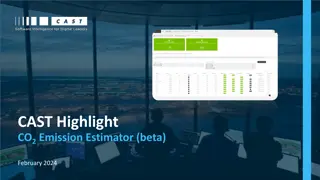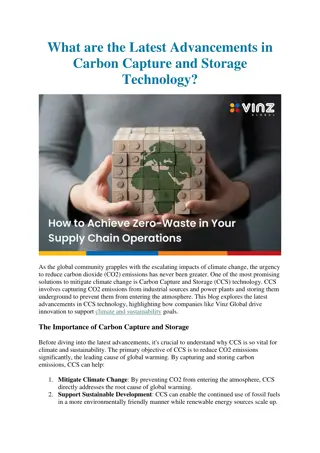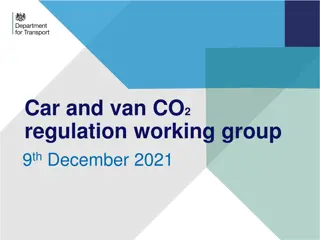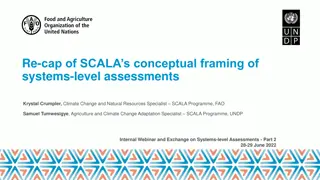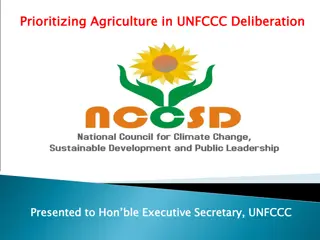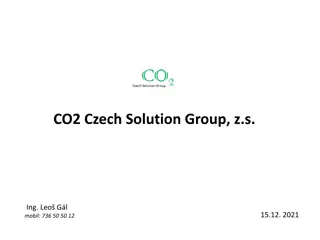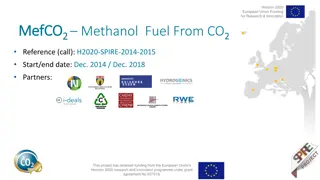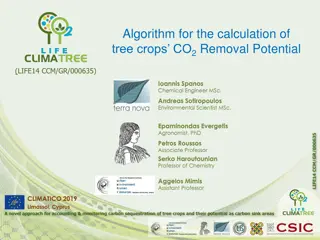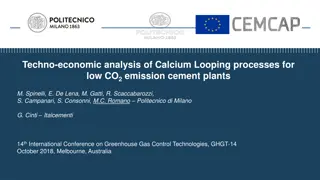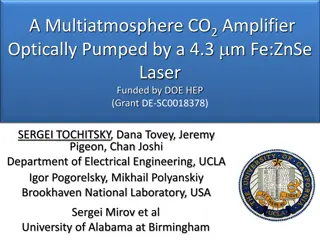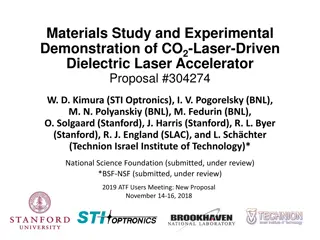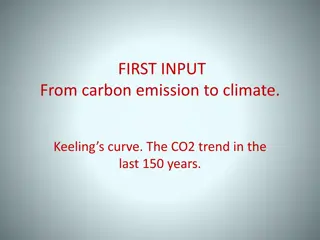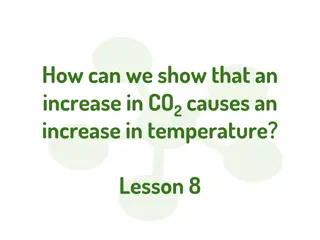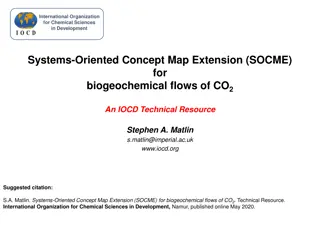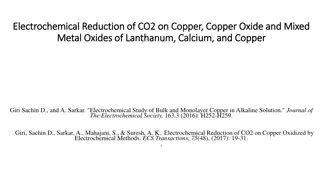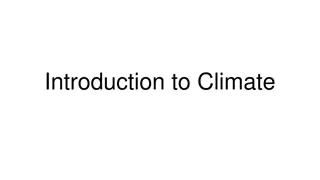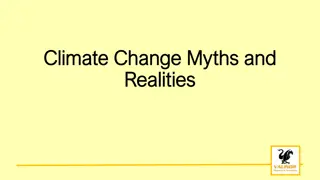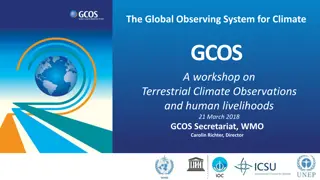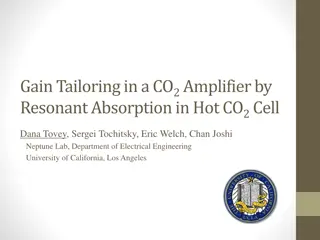IPCC Climate Change Solutions: CO2 Scrubbers
In the fight against climate change, CO2 scrubbers are proposed solutions recommended by IPCC. These devices capture carbon dioxide from the atmosphere, helping to mitigate global warming. By understanding their role and effectiveness in reducing greenhouse gas emissions, we can work towards a more sustainable future. Learn about the science behind CO2 scrubbers and how they contribute to addressing the pressing issue of climate change.
Download Presentation

Please find below an Image/Link to download the presentation.
The content on the website is provided AS IS for your information and personal use only. It may not be sold, licensed, or shared on other websites without obtaining consent from the author.If you encounter any issues during the download, it is possible that the publisher has removed the file from their server.
You are allowed to download the files provided on this website for personal or commercial use, subject to the condition that they are used lawfully. All files are the property of their respective owners.
The content on the website is provided AS IS for your information and personal use only. It may not be sold, licensed, or shared on other websites without obtaining consent from the author.
E N D
Presentation Transcript
IPCC Climate Change Solutions CO2 Scrubbers
Learning intentions: Students will... ... demonstrate ways in which net-zero carbon emissions can be reached by 2050. Success criteria: Students can design a solution for recovering CO2 from Earth's atmosphere and processing the recovered material by drawing on knowledge of molecules and current research in this area (Year 8) demonstrate an understanding of the atomic nature of carbon dioxide by designing a solution for recovering CO2 from Earth's atmosphere and processing the recovered material (Years 9 & 10).
The Intergovernmental Panel on Climate Change (IPCC) is the United Nations body for assessing the science related to climate change. It was created to provide policymakers (governments) with regular scientific updates about climate change; highlight the impact climate change will have on the planet in the future; and, offer some ideas about how to tackle the challenges of climate change's potential effects on the planet. In 2021-22, the IPCC released Part 1 of the Sixth Assessment Report. This is the most up-to-date physical understanding of the climate system and climate change.
The report makes a number of important points: It is unequivocal that human influence has warmed the atmosphere, ocean and land (A1). What does the word unequivocal mean? Global surface temperature will continue to increase until at least mid-century under all emissions scenarios considered. Global warming of 1.5 C and 2 C will be exceeded during the 21st century unless deep reductions in CO2 and other greenhouse gas emissions occur in the coming decades (B1). The report describes five possible climate futures, where #1 is not great and #5 is extremely bad. If we want to keep global warming at less than two degrees, which the IPCC says is the best-case scenario, we need to reduce our C02 and greenhouse gas emissions significantly and start right away.
'Net zero' or 'carbon neutral' are terms that refer to achieving an overall balance between greenhouse gas emissions produced and greenhouse gas emissions taken out of the atmosphere. Getting to net zero means we can still produce some emissions, so long as we're doing something else to reduce the greenhouse gases already in the atmosphere at the same time, kind of like balancing a set of scales (more info).
The most important and proactive step in addressing our current climate crisis is to reduce our carbon emissions to net-zero. Every additional increment of global warming, changes in extremes grow exponentially. However, the IPCC report states that even if in the best-case emissions scenario they considered - that is, if we dramatically reduce our emissions and work on nursing the planet back to health - global surface temperature will still continue to increase until at least mid-century.
Thinking creatively, how could we remove a lot of the carbon emissions we have already created, rather than just aiming to reduce further emissions in the future?
Overview of cellular respiration | Cellular respiration | Biology | Khan Academy Overview of cellular respiration. Includes glycolysis, pyruvate oxidation, the citric acid (Krebs) cycle, and oxidative phosphorylation. Watch the next lesson: https://www.khanacademy.org/science/biology/cellular-respiration-and-fermentation/glycolysis/v/glycolysis?utm_source=YTutm_medium=Descutm_campaign=biology Missed the previous lesson? https://www.khanacademy.org/science/biology/cellular-respiration-and-fermentation/intro-to-cellular-respiration/v/oxidation-and-reduction-in-cellular-respiration?utm_source=YTutm_medium=Descutm_campaign=biology Biology on Khan Academy: Life is beautiful! From atoms to cells, from genes to proteins, from populations to ecosystems, biology is the study of the fascinating and intricate systems that make life possible. Dive in to learn more about the many branches of biology and why they are exciting and important. Covers topics seen in a high school or first-year college biology course. About Khan Academy: Khan Academy offers practice exercises, instructional videos, and a personalized learning dashboard that empower learners to study at their own pace in and outside of the classroom. We tackle math, science, computer programming, history, art history, economics, and more. Our math missions guide learners from kindergarten to calculus using state-of-the-art, adaptive technology that identifies strengths and learning gaps. We've also partnered with institutions like NASA, The Museum of Modern Art, The California Academy of Sciences, and MIT to offer specialized content. For free. For everyone. Forever. #YouCanLearnAnything Subscribe to Khan Academy's Biology channel: https://www.youtube.com/channel/UC82qE46vcTn7lP4tK_RHhdg?sub_confirmation=1 Subscribe to Khan Academy: https://www.youtube.com/subscription_center?add_user=khanacademy
Mass (or matter) can neither be created or destroyed, although it can change forms. We have a lot of carbon dioxide which is not helping the atmosphere, but within that CO2 are some actually very useful oxygen molecules.
The CO2 breathed by astronauts aboard the International Space Station is captured by a sponge-like mineral called a zeolite, which has tiny pores to lock in a CO2 molecule. The zeolites empty their CO2 when exposed to the vacuum of space.
YOUR CHALLENGE Design a way to remove carbon dioxide from the atmosphere. Success criteria: Students can design a solution for recovering CO2 from Earth's atmosphere and processing the recovered material by drawing on knowledge of molecules and current research in this area (Year 8) demonstrate an understanding of the atomic nature of carbon dioxide by designing a solution for recovering CO2 from Earth's atmosphere and processing the recovered material (Years 9 & 10).
Some considerations: How your solution works: How is your solution absorbing and filtering carbon dioxide from the atmosphere? Fuel: What is powering the solution? Remember, if we use fossil fuels to generate the energy to recover carbon dioxide, we are simply producing more carbon dioxide to replace it. Storage: What is happening to the CO2 after it is recovered from the atmosphere? Explain how this solution will not cause more environmental issues in the future.
Artificial Trees That Absorb CO2 - Hot Planet Preview - BBC One Subscribe and Stream original BBC programmes FIRST on BBC iPlayer to OFFICIAL BBC YouTube https://bit.ly/2IXqEIn ? https://bbc.in/2J18jYJ ? ? http://www.bbc.co.uk/bbcone More about this episode: http://www.bbc.co.uk/programmes/b00jf6md Professors Iain Stewart and Professor Kathy Sykes take a timely look at global warming, exploring the world's leading climate scientists' vision of the planet's future. #bbc All our TV channels and S4C are available to watch live through BBC iPlayer, although some programmes may not be available to stream online due to rights. If you would like to read more on what types of programmes are available to watch live, check the 'Are all programmes that are broadcast available on BBC iPlayer?' FAQ https://bbc.in/2m8ks6v. ?
Reflection What potential challenges do you see with implementing this solution? What part of the solution do you think still requires some thought?


